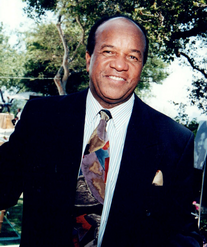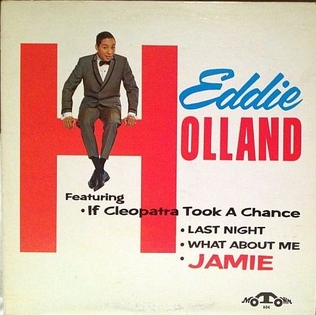Related Research Articles
Motown is an American record label owned by the Universal Music Group. It was founded by Berry Gordy Jr. as Tamla Records on January 12, 1959, and incorporated as Motown Record Corporation on April 14, 1960. Its name, a portmanteau of motor and town, has become a nickname for Detroit, where the label was originally headquartered.

Road Runner is a 1966 album by Junior Walker & the All-Stars. The band's second album, it reached #6 on Billboard's Top R&B Albums chart and #64 on Billboard's Top Albums chart, launching four hit singles. First released on record by Motown's Soul label in the US and Tamla/Motown internationally, it has been multiply reissued on cassette and compact disc. It has also been remastered and reissued in conjunction with the band's following studio record, Home Cookin', as Road Runner & Home Cookin'.

Mary Esther Wells was an American singer, who helped to define the emerging sound of Motown in the early 1960s.

The Marvelettes were an American girl group that achieved popularity in the early to mid-1960s. They consisted of schoolmates Gladys Horton, Katherine Anderson, Georgeanna Tillman, Juanita Cowart, and Georgia Dobbins, who was replaced by Wanda Young prior to the group signing their first deal. They were the first successful act of Motown Records after the Miracles and its first significantly successful female group after the release of the 1961 number-one single, "Please Mr. Postman", one of the first number-one singles recorded by an all-female vocal group and the first by a Motown recording act.
The Originals, often called "Motown's best-kept secret", were a successful Motown R&B and soul group during the late 1960s and the 1970s, most notable for the hits "Baby I'm for Real", "The Bells", and the disco classic "Down to Love Town." Formed in 1966, the group originally consisted of baritone singer Freddie Gorman, tenor/falsetto Walter Gaines, and tenors C. P. Spencer and Hank Dixon. Ty Hunter replaced Spencer when he left to go solo in the early 1970s. They had all previously sung in other Detroit groups, Spencer having been an original member of the (Detroit) Spinners and Hunter having sung with the Supremes member Scherrie Payne in the group Glass House. Spencer, Gaines, Hunter, and Dixon were also members of the Voice Masters. As a member of the Holland–Dozier–Gorman writing-production team, Gorman was one of the co-writers of Motown's first number 1 pop hit "Please Mr. Postman", recorded by the Marvelettes. In 1964 the Beatles released their version and in 1975 the Carpenters took it to number 1 again. This was the second time in pop history that a song had reached number 1 twice as "The Twist" by Chubby Checker, reached number 1 in both 1960 and 1961. In 2006, "Please Mr. Postman" was inducted into the Songwriters Hall of Fame.

"Please Mr. Postman" is a song written by Georgia Dobbins, William Garrett, Freddie Gorman, Brian Holland and Robert Bateman. It is the debut single by the Marvelettes for the Tamla (Motown) label, notable as the first Motown song to reach the number-one position on the Billboard Hot 100 pop singles chart. The single achieved this position in late 1961; it hit number one on the R&B chart as well. "Please Mr. Postman" became a number-one hit again in early 1975 when The Carpenters' cover of the song reached the top position of the Billboard Hot 100. "Please Mr. Postman" has been covered several times, including by the British rock group the Beatles in 1963. The 2017 song "Feel It Still" by Portugal. The Man draws on "Please Mr. Postman" and includes a credit for Brian Holland.

The Soulful Moods of Marvin Gaye is the debut studio album by Marvin Gaye, released in 1961, and the second long-playing album (TM-221) released by Motown. The first was Hi... We're the Miracles (TM-220). It is most notable as the album that caused the first known struggle of Gaye's turbulent tenure with the label.

Marvin Earl Johnson was an American R&B singer, songwriter and pianist. He was influential in the development of the Motown style of music, primarily for the song "Come to Me," which was the first record issued by Tamla Records, the precursor to the famous label.

Meet the Supremes is the debut studio album by The Supremes, released in late 1962 on Motown.

Robert Louis Gordy was an American songwriter, music publishing executive, and recording artist under the stage name Bob Kayli. He released the minor hit song "Everyone Was There" in 1958. He was the brother of Motown founder Berry Gordy Jr. and uncle of Redfoo.

Hi... We're the Miracles is the first album by The Miracles, Motown's first group, released on Motown's Tamla subsidiary label in the summer of 1961. It was the first album released by the Motown Record Corporation. The album features several songs that played an important role in defining The Motown Sound and establishing songwriters Smokey Robinson and Berry Gordy.

Greatest Hits from the Beginning is a compilation double LP by The Miracles released in 1965. This was the first double album ever released by the Motown Record Corporation. It covers most of the group's hits from their pre-1965 albums, such as "Shop Around", "Who's Lovin’ You", "You've Really Got A Hold On Me" and "Mickey's Monkey", as well as the non-album singles from 1964: "I Like It Like That" and "That's What Love Is Made Of". The album was a success, reaching #21 on the Billboard Pop Album Chart. It was also the first Miracles album to chart on the Billboard R&B Album chart, where it was an even bigger success, peaking at #2.
"Bye Bye Baby" is the first single by R&B singer Mary Wells, released in September 1960 on the Motown label. The song was one of Motown's earliest hit singles and showcased a much rougher vocal than the singer had during her later years.
"Buttered Popcorn" is a 1961 song written by Motown executives Berry Gordy and Barney Ales, produced by Gordy, and released as a Tamla label single by Motown singing group The Supremes. It was the group's second single after signing with Motown Records as well as their second, and last, single for the Tamla label, before moving to the Motown label.

Please Mr. Postman is the 1961 studio debut album from Motown girl group The Marvelettes and the sixth album ever released by the company. The focal track is the number-one hit single, "Please Mr. Postman". The album notably features cover versions of label mates The Miracles' "Way Over There" and "I Want a Guy", which was the debut single for fellow Motown girl group The Supremes the same year, and their cover had served as the b-side to "Twistin' Postman" the less successful follow-up to "Please Mr. Postman." Although the original version by The Supremes flopped, The Marvelettes' cover became a regional hit.
Raynoma Mayberry Liles Gordy Singleton was an American R&B producer, songwriter, and vocalist perhaps best known for her association with ex-husband, Berry Gordy during the early days of Motown when she was often known as Miss Ray.
"Come to Me" is the debut single by American singer Marv Johnson. It is notable as the first single to be released by what would eventually become known as Motown, on the newly formed Tamla Records label. It also became Johnson's first hit single after the song was nationally distributed by United Artists. It was recorded at United Sound Systems.
Freddie Gorman was an American musician and record producer, most famous as a singer, songwriter for the Motown label in the late 1960s and mid 1970s.
Robert Bateman was an American R&B singer, songwriter and record producer. Among other songs, he co-wrote the hits "Please Mr. Postman" and "If You Need Me".

Eddie Holland is the sole studio album by American rhythm and blues songwriter Eddie Holland, released on Motown in 1962.
References
- 1 2 3 4 5 6 Colin Larkin, ed. (2002). The Virgin Encyclopedia of Fifties Music (Third ed.). Virgin Books. p. 379. ISBN 1-85227-937-0.
- ↑ "The Satintones | Biography & History". AllMusic . Retrieved October 27, 2019.
- ↑ "The Satintones". Motownjunkies.co.uk. Retrieved October 27, 2019.
- ↑ The Satintones Sing! The Complete Tamla and Motown Singles liner notes by Keith Hughes, 2009
- ↑ The Complete Motown Singles Vol. 1: 1959-1961 liner notes by Keith Hughes and Bill Dahl, 2006
- ↑ "The Satintones Page". Soulwalking.co.uk. Retrieved October 27, 2019.
- ↑ The Satintones, HarmonyTrain.com. Retrieved 17 October 2016
- ↑ McCollum, Brian. "Motown songwriter Robert Bateman dies at 80". Detroit Free Press .
- ↑ Sonny Sanders, FindaGrave.com. Retrieved 14 October 2016